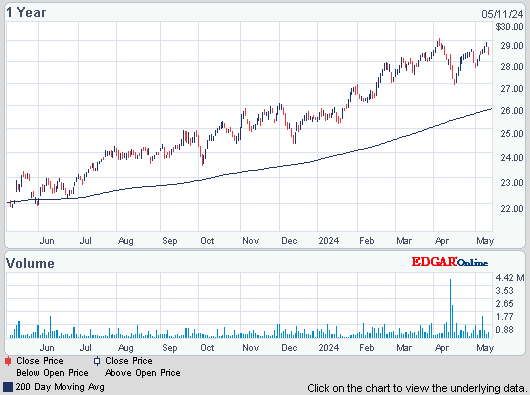Dow went up 46, advancers ahead of decliners 2-1 & NAZ advanced 19. The MLP index rose 2 to the 444s & the REIT index 2+ to the 265s. Junk bond funds inched higher & Treasuries gained ground, especially for longer maturities. Oil
climbed after a drop in purchases of newly built US homes last
month bolstered speculation the Federal Reserve (FED) will defer
tapering stimulus measures. Gold jumped to a 11-week high after
sales of new US homes fell more than forecast, boosting
speculation that the FED will maintain fiscal
stimulus to aid the economy.
AMJ (Alerian MLP Index tracking fund)

![Live 24 hours gold chart [Kitco Inc.]](http://www.kitco.com/images/live/gold.gif)

The US central bank’s bond buying is a less potent tool for stimulating growth than policy makers believe, 2 economists said in a paper released today at a FED conference. The paper scrutinizes the stance of some FED officials that quantitative easing works thru a “portfolio-balance channel” in which FED asset purchases induce investors to rebalance their investments to boost a wide range of financial assets. The research was presented at an annual symposium in Jackson Hole, Wyoming. “The portfolio balance channel of QE works largely through narrow channels that affect the prices of purchased assets, with spillovers depending on particulars of the assets and economic conditions,” Northwestern University finance professor Arvind Krishnamurthy & University of California-Berkeley professor Annette Vissing-Jorgensen wrote in the paper. “It does not, as the Fed proposes, work through broad channels such as affecting the term premium on all long-term bonds.” The work has influenced the debate at the FED before, with a previous paper of theirs cited by Big Ben last year in Jackson Hole that made the case for a 3rd round of bond purchases, QE3. Despite working thru narrower channels, the buying of mortgage-backed securities in QE3 has been more effective at boosting the economy thru its effect on mortgage rates, according to the paper.
Economists in Jackson Hole Say QE Less Potent Than Fed Believes

Photo: Bloomberg
Restaurant sales contracted in Jun & Jul, even as spending on other discretionary categories such as automobiles & homes grew, a sign some Americans remain budget conscious. Results at casual-dining establishments fell 3½%, following a 2% drop in Jun, according to the Knapp-Track Index. This marked the first 2 consecutive declines in sales after the industry was rocked by its worst streak in almost 3 years between Dec & Feb. Preliminary data suggest that Aug sales still are weak, though “better than July,” said Malcolm Knapp, a consultant who created the index & has monitored the industry since 1970. The summer slowdown is a symptom of a “reallocation nation,” in which people choose between different discretionary items to purchase each month, he said. “Consumers’ priorities change every month based on what they can afford,” Knapp said. Many Americans don’t eat out as often as they would like, & they’ve had to cut back “very begrudgingly” on meals away from home to help subsidize other purchases.

Photo: Bloomberg
Debt ratings of the biggest banks may be cut by Moody’s as it examines whether the U.S. would be less likely to ensure creditors are repaid in a crisis, including Morgan Stanley (MS), Wells Fargo (WFC), Citigroup (C) & Bank of America (BAC - a Dow stock). Moody’s & S&P have said downgrades may be needed because the federal gov has new tools to wind down banks instead of rescuing them with taxpayer money. Those plans can include forcing debtholders to incur losses or convert stakes to equity. The policies also may have an impact on ratings of the companies’ deposit-taking subsidiaries. “In the past year, we have seen progress towards establishing a framework to credibly resolve these large systemically important banks,” Robert Young, a Moody’s managing director, said. The reviews may lead to a 1 or 2 step downgrade at the banks depending on the level of gov support built in to the ratings, Moody’s said. Bank stocks have been hot for more than a year, they are vulnerable to selling.
Biggest U.S. Banks Face Moody’s Downgrades as Government Withdraws Support
The big news today was Steve Ballmer retiring from Microsoft (MSFT - a Dow stock) after being with the company since its start. The stock jumped 2.37, hoping for better times from a new CEO. The financial biggies are meeting in Jackson Hole which will produce a lot of hot air about ending easy money by the FED. Next week will bring even slower trading days. Dow fell 71 last week.
Dow Jones Industrials

AMJ (Alerian MLP Index tracking fund)
Treasury yields:
U.S. 3-month |
0.03% | |
U.S. 2-year |
0.38% | |
U.S. 10-year |
2.82% |
| CLV13.NYM | ...Crude Oil Oct 13 | ....106.40 | (1.3%) |
![Live 24 hours gold chart [Kitco Inc.]](http://www.kitco.com/images/live/gold.gif)

The US central bank’s bond buying is a less potent tool for stimulating growth than policy makers believe, 2 economists said in a paper released today at a FED conference. The paper scrutinizes the stance of some FED officials that quantitative easing works thru a “portfolio-balance channel” in which FED asset purchases induce investors to rebalance their investments to boost a wide range of financial assets. The research was presented at an annual symposium in Jackson Hole, Wyoming. “The portfolio balance channel of QE works largely through narrow channels that affect the prices of purchased assets, with spillovers depending on particulars of the assets and economic conditions,” Northwestern University finance professor Arvind Krishnamurthy & University of California-Berkeley professor Annette Vissing-Jorgensen wrote in the paper. “It does not, as the Fed proposes, work through broad channels such as affecting the term premium on all long-term bonds.” The work has influenced the debate at the FED before, with a previous paper of theirs cited by Big Ben last year in Jackson Hole that made the case for a 3rd round of bond purchases, QE3. Despite working thru narrower channels, the buying of mortgage-backed securities in QE3 has been more effective at boosting the economy thru its effect on mortgage rates, according to the paper.
Economists in Jackson Hole Say QE Less Potent Than Fed Believes

Photo: Bloomberg
Restaurant sales contracted in Jun & Jul, even as spending on other discretionary categories such as automobiles & homes grew, a sign some Americans remain budget conscious. Results at casual-dining establishments fell 3½%, following a 2% drop in Jun, according to the Knapp-Track Index. This marked the first 2 consecutive declines in sales after the industry was rocked by its worst streak in almost 3 years between Dec & Feb. Preliminary data suggest that Aug sales still are weak, though “better than July,” said Malcolm Knapp, a consultant who created the index & has monitored the industry since 1970. The summer slowdown is a symptom of a “reallocation nation,” in which people choose between different discretionary items to purchase each month, he said. “Consumers’ priorities change every month based on what they can afford,” Knapp said. Many Americans don’t eat out as often as they would like, & they’ve had to cut back “very begrudgingly” on meals away from home to help subsidize other purchases.

Photo: Bloomberg
Debt ratings of the biggest banks may be cut by Moody’s as it examines whether the U.S. would be less likely to ensure creditors are repaid in a crisis, including Morgan Stanley (MS), Wells Fargo (WFC), Citigroup (C) & Bank of America (BAC - a Dow stock). Moody’s & S&P have said downgrades may be needed because the federal gov has new tools to wind down banks instead of rescuing them with taxpayer money. Those plans can include forcing debtholders to incur losses or convert stakes to equity. The policies also may have an impact on ratings of the companies’ deposit-taking subsidiaries. “In the past year, we have seen progress towards establishing a framework to credibly resolve these large systemically important banks,” Robert Young, a Moody’s managing director, said. The reviews may lead to a 1 or 2 step downgrade at the banks depending on the level of gov support built in to the ratings, Moody’s said. Bank stocks have been hot for more than a year, they are vulnerable to selling.
Biggest U.S. Banks Face Moody’s Downgrades as Government Withdraws Support
The big news today was Steve Ballmer retiring from Microsoft (MSFT - a Dow stock) after being with the company since its start. The stock jumped 2.37, hoping for better times from a new CEO. The financial biggies are meeting in Jackson Hole which will produce a lot of hot air about ending easy money by the FED. Next week will bring even slower trading days. Dow fell 71 last week.
Dow Jones Industrials
Like many of you, I’m a huge fan of INO, and from what I have seen so far, their service Marketclub! This isn’t a stripped down version, everything in MarketClub is available to you. I don’t want to give everything away, but you’ll have unlimited access to my favorite three tools: Trade Triangles, Smart Scan, and Alerts! The best part is that the MarketClub customer support team will be providing UNLIMITED support! You can call or email for an instant response to any question, comment or concern.
Here’s that link:
https://club.ino.com/join/specialtrial/index_free.html?a_aid=CD3289&a_bid=359ef9a3
I’d recommend you jump on this now.








No comments:
Post a Comment